My kids are stealing all my clothes.
Well, maybe not all of them. My suits, sports coats, and jeans seem to be safe for now.
But any of my grunge band t-shirts, flannels, hoodies, sweatpants, and even my vintage Steelers merch are prone to disappear without a trace. Tara is victimized too.
It’s emblematic of a larger macro trend we talk about often.
The rise of nostalgia in modern culture – not so much as a fashion statement, but as a source of emotional comfort – is a stark reflection of the human psyche today. Our data shows that older generations universally romanticize the era they grew up in, specifically the decade in and around their teenage years. What’s unintuitive, however, is that nostalgic motivations are highest among teens and early 20-somethings.
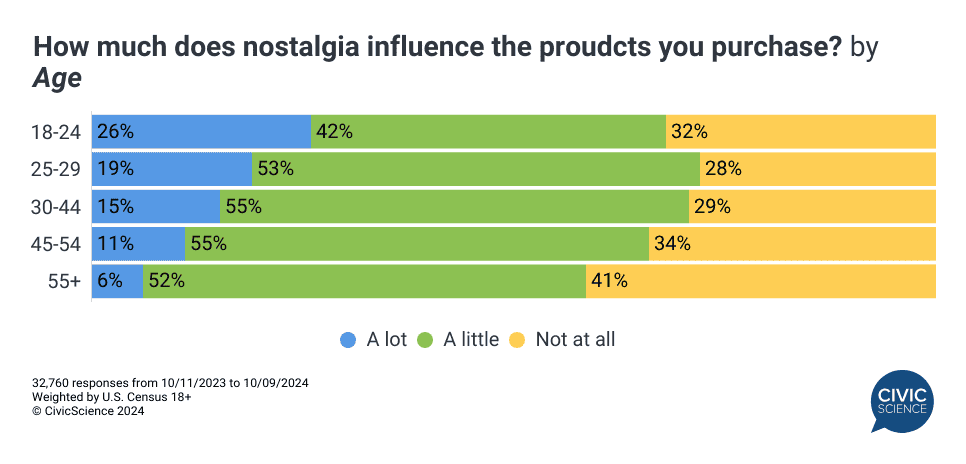
Gen Z is yearning for times that came long before they were born.
Having the world’s entire history of movies, television, and music at their fingertips is a major contributor. Our kids binge-watch Friends and The West Wing, listen to The Cranberries, and watch John Hughes and Rob Reiner movies on repeat. It gives them glimpses into “before times,” when things appeared simpler, less divided, even – gasp! – patriotic, and nobody was glued to a phone 24/7.
Since childhood, Gen Z’s been either bombarded or catching vitriolic shrapnel from so-called grown-ups, ranting about how the country is falling apart, the economy is in shambles, the climate is fucked, and you can’t trust anyone, not even science. Whether any of that’s true or not doesn’t matter when you’re too young to know the difference.
Ironic that much about those bygone days was far from “Great,” as evidenced by the old movies and TV shows our kids are watching. Start with the racial and LGBTQ caricatures (and slurs), presuming anyone non-white or gay people even made an appearance (See above: Friends). Half those ‘90s grunge singers never lived to see 30. Hidden by Hollywood were our stratospheric levels of violent crime, divorce, and poverty. Norman Rockwell, it was not.
Incessant catastrophizing by politicos and their media tribemates might garner votes or clicks in the short term, but the long-term damage will take years to measure. Let’s hope it’s not a self-fulfilling prophecy. Otherwise, I’m confident this brilliant generation can fix it.
Shame on us for letting younger people feel scared, unsafe, hopeless, and alone – for letting them believe any era before them was so much better. We’ve lost sight of all the blessings of today. There are many, and you know it.
Be honest.
Because I really want my clothes back.
Here’s what we’re seeing:
Consumer confidence fell marginally over the past two weeks. Even after talking last week about how important these measures are, I still hesitate to highlight them right now. There simply isn’t a clear enough pattern to make sense of it – and likely won’t be until after the election, if not longer. Nonetheless, I’ve promised you a real-time of how consumers are feeling, so here you go. This time around is a mixed bag with a small decline, net of particularly negative views of the job market, slightly lower views of the housing market, and upticks on the longer-term U.S. economy and confidence in making major purchases. Call it a wash.
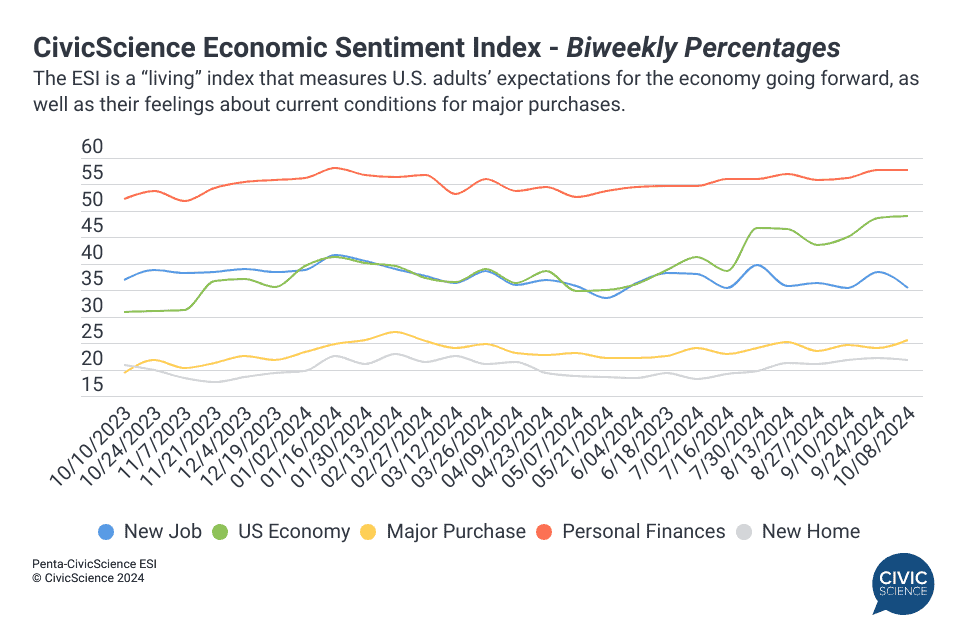
The pandemic – and the current economic climate – have shuffled older Americans’ retirement plans. As the dust settles on the much-touted Great Resignation, we see that a large number of older Gen Xers and Boomers have remained outside the workforce, while less than 1 in 3 have returned. Across the entire workforce between the ages of 55 and 64, fewer this year say they plan to work past 65, compared to last year. Among those post-Covid boomerangers, however, a much larger share believe they’ll work into their late 60s and beyond. A steady source of income and benefits are major reasons (not cool), however, a growing group merely wants to pursue new interests (cool).

Social media has a major trust problem. In the latest free excerpt from our monthly Election Mindset Tracker, we found even further evidence of eroding institutional trust across our country. All levels of government and traditional media are clearly in negative territory, but distrust in social media companies is on another level. We also saw that viewership of last month’s presidential debate was high, but disproportionately few moderates or independents (i.., swing voters) tuned in. Meanwhile, across the main swing states, voters in Arizona and North Carolina are the most worried about crime, while those in Nevada and Pennsylvania are the most concerned about reproductive rights.
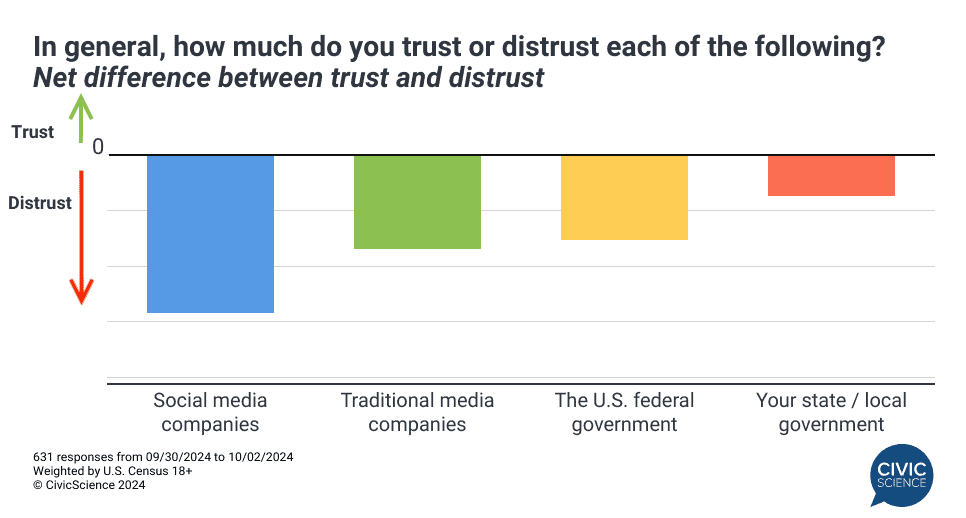
Americans have become far more astute Doomsday preppers. One in four U.S. adults say they’re much more likely to keep emergency stockpiles of household essentials than they were before Covid (good news for Sam’s Club and Costco). Even during the short-lived dockworker’s strike last week, a non-trivial percentage of people were gearing up to hoard a variety of products (thankfully they didn’t have to). Also, in an uncharacteristically depressing 3 Things to Know this week, we looked at the dramatically higher fears about school safety among lower-income families and the one-third of student debt holders who are “very concerned” about the upcoming end to the repayment buffer.
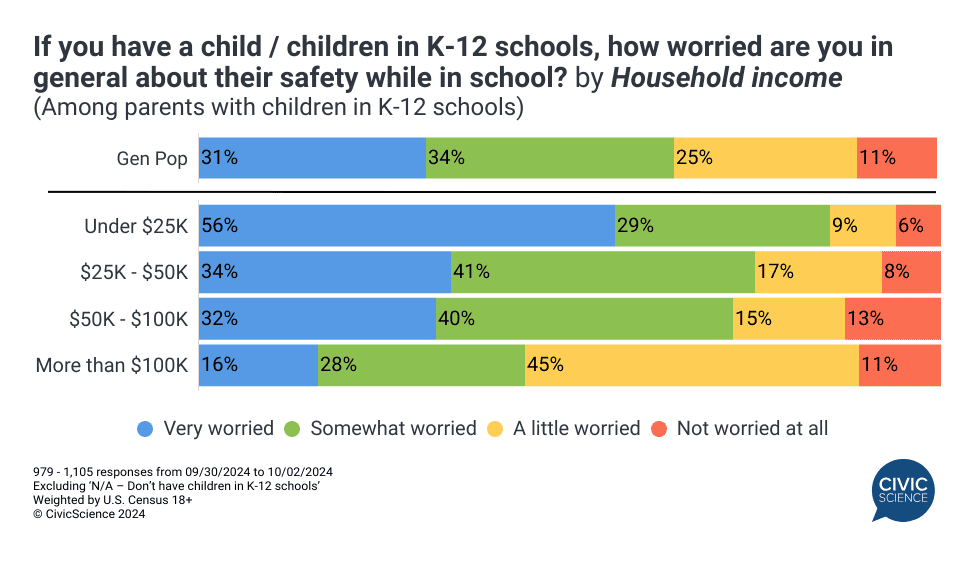
People are finding all kinds of ways to regulate their food buying. In Q3, the percentage of Americans who said they plan to dine in or order takeout from a restaurant “in the next week” fell for the second consecutive quarter and the fourth of the last five. Fifty-nine percent of those cutting back on spending say they’ve cut back on restaurant visits in the last six months, while many others are cutting corners by trading down, ordering smaller items, using coupons, and even tipping less (boo!). Concurrently, a larger share of those dollars is shifting to the grocery store, where people are spending more on perishable goods.
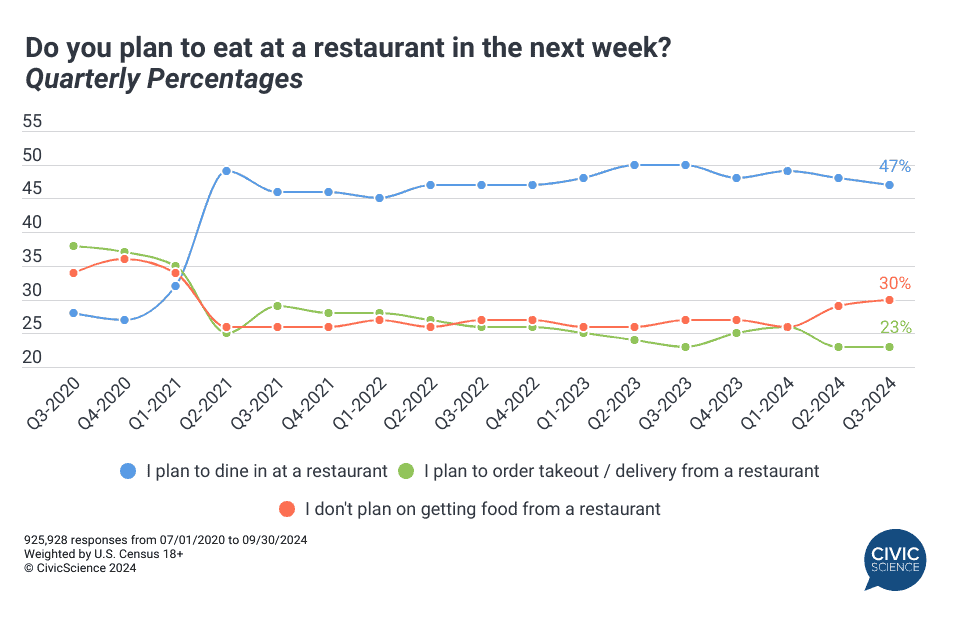
More awesomeness from the InsightStore™:
- Here are five unexpected insights about people who collect vinyl records;
- And five more about people who eat at Panda Express;
- If you missed our Prime Day webinar on Thursday after the event, here are some of the previews…hit me up if you want the full recording.
The most popular questions this week:
How often do you stay up unreasonably late binge-watching TV?
Do you always wash your fruits and vegetables before consuming them?
How often do you take an emotional wellness day for yourself?
Do you know how to ride a horse?
Answer Key: Unless it’s an annoyingly delayed Sunday night Steeler game, hardly ever; Not even a little; Always; I’ll let you know when I take my first one; Nope.
Hoping you’re well.
JD








